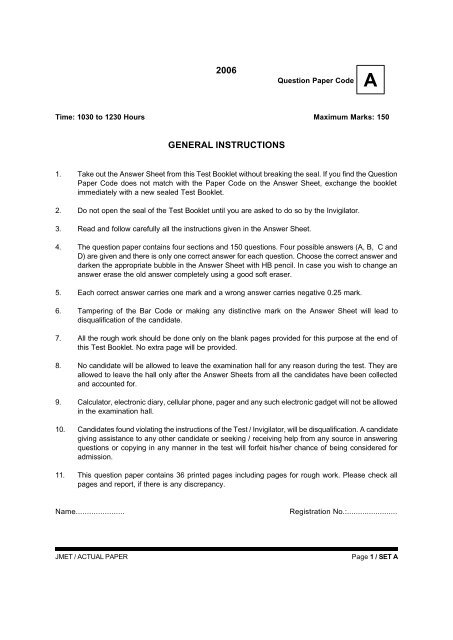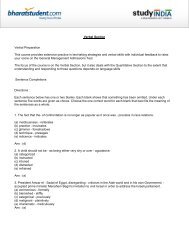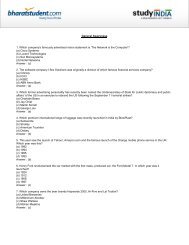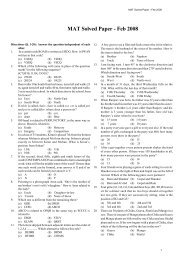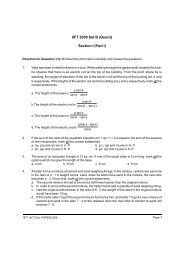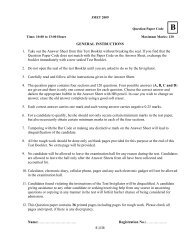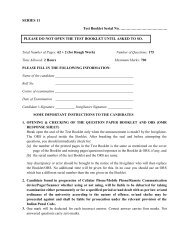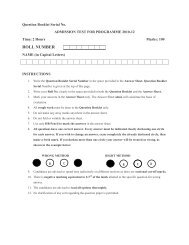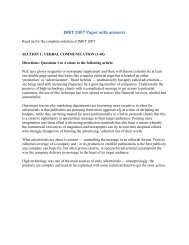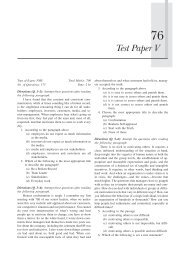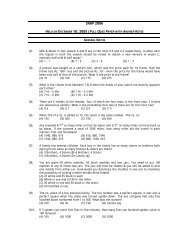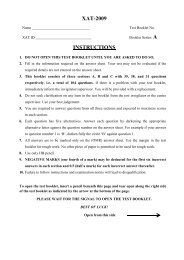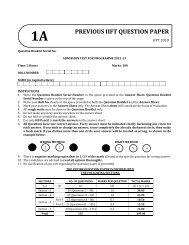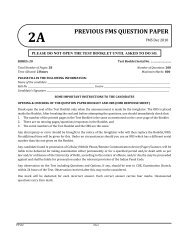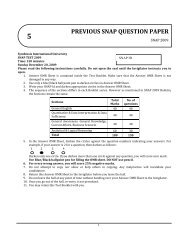2006 GENERAL INSTRUCTIONS
2006 GENERAL INSTRUCTIONS
2006 GENERAL INSTRUCTIONS
You also want an ePaper? Increase the reach of your titles
YUMPU automatically turns print PDFs into web optimized ePapers that Google loves.
<strong>2006</strong><br />
Question Paper Code<br />
Time: 1030 to 1230 Hours Maximum Marks: 150<br />
<strong>GENERAL</strong> <strong>INSTRUCTIONS</strong><br />
1. Take out the Answer Sheet from this Test Booklet without breaking the seal. If you find the Question<br />
Paper Code does not match with the Paper Code on the Answer Sheet, exchange the booklet<br />
immediately with a new sealed Test Booklet.<br />
2. Do not open the seal of the Test Booklet until you are asked to do so by the Invigilator.<br />
3. Read and follow carefully all the instructions given in the Answer Sheet.<br />
4. The question paper contains four sections and 150 questions. Four possible answers (A, B, C and<br />
D) are given and there is only one correct answer for each question. Choose the correct answer and<br />
darken the appropriate bubble in the Answer Sheet with HB pencil. In case you wish to change an<br />
answer erase the old answer completely using a good soft eraser.<br />
5. Each correct answer carries one mark and a wrong answer carries negative 0.25 mark.<br />
6. Tampering of the Bar Code or making any distinctive mark on the Answer Sheet will lead to<br />
disqualification of the candidate.<br />
7. All the rough work should be done only on the blank pages provided for this purpose at the end of<br />
this Test Booklet. No extra page will be provided.<br />
8. No candidate will be allowed to leave the examination hall for any reason during the test. They are<br />
allowed to leave the hall only after the Answer Sheets from all the candidates have been collected<br />
and accounted for.<br />
9. Calculator, electronic diary, cellular phone, pager and any such electronic gadget will not be allowed<br />
in the examination hall.<br />
10. Candidates found violating the instructions of the Test / Invigilator, will be disqualification. A candidate<br />
giving assistance to any other candidate or seeking / receiving help from any source in answering<br />
questions or copying in any manner in the test will forfeit his/her chance of being considered for<br />
admission.<br />
11. This question paper contains 36 printed pages including pages for rough work. Please check all<br />
pages and report, if there is any discrepancy.<br />
Name...................... Registration No.:.......................<br />
JMET / ACTUAL PAPER Page 1 / SET A<br />
A
Page 2 / SET A<br />
Section I: VERBAL COMMUNICATION (1 – 40)<br />
Directions: Read the following passage to answer Questions 1-4. Choose the correct option in<br />
each of the questions.<br />
We define the entrepreneur as an individual who identifies opportunities, and on the basis of his/her ability,<br />
desire and confidence, makes judgements and decisions pertaining to the coordination of resources in<br />
order to exploit those opportunities for personal gain. Personal gain in this context could be financial, fame,<br />
prestige or satisfaction from helping other people. This definition extends the concept beyond the narrow<br />
limits of profit maximization. It is important to note that entrepreneurial decision making is distinct from<br />
routine managerial / administrative decision making by corporate executives. However, this definition does<br />
include innovative venture decisions by executives and others in an already existing organization as legitimate<br />
entrepreneurial function. The entrepreneurial function consists of three main elements: recognition of<br />
opportunities, judgemental decision and coordination of resources. In terms of organization, the entrepreneur<br />
will be involved in risk bearing, autonomous decision making and residual claims.<br />
Every person is potentially an entrepreneur. However, the extent of its manifestation in actual entrepreneurial<br />
activities, business or otherwise, is a matter of political, social, economic, cultural and ideological influences.<br />
Put differently, every human being has an innate ability to become an entrepreneur even though this ability<br />
is not always translated into action because of a variety of limiting factors. This observation allows us to<br />
propose that there are more than 5 billion entrepreneurs in this world, even though this conjecture may not<br />
have been fully manifested in the practical world of business.<br />
If there are more than 5 billion entrepreneurs in this world, how is it that there is such a dearth of entrepreneurs<br />
in the world of business? This is an important question in view of the fact that business communities,<br />
academia and policy makers in the public realm have begun to talk about possibilities for fostering<br />
entrepreneurial growth in the global economy.<br />
1. As per the passage, an entrepreneur is one who:<br />
a. take the commercial venture decisions. b. exploits opportunities for personal gain.<br />
c. invites participation in decision–making d. focuses on maximizing cash profits.<br />
2. Which of the following statements is NOT correct, according to the passage?<br />
a. There are more than 4 billion potential entrepreneurs in this world.<br />
b. Not everybody can become an entrepreneur.<br />
c. Entrepreneurial decision–making is different from managerial decision-making.<br />
d. Executives in organizations can be either managers or entrepreneurs, but not both.<br />
3. The passage mentions the following functions of an entrepreneur:<br />
a. Risk-taking, decision-making, encouraging creativity.<br />
b. Coordinating resources, recognizing opportunities and leading from the front.<br />
c. Independent decision-making, exploiting opportunities and maximizing profits.<br />
d. Making judgements, innovating and claiming responsibility.<br />
JMET / ACTUAL PAPER
4. The passage implies that it is important to understand:<br />
a. why there are so few entrepreneurs in business.<br />
b. the main functions of an entrepreneur.<br />
c. the factors which inhibit entrepreneurship.<br />
d. the meaning of personal gain for an entrepreneur.<br />
1. b Given clearly in lines 1-3 ‘ We define the entrepreneur…..in order to exploit these opportunities for<br />
personal gain’<br />
2. d This statement is nowhere given in the passage, thus is definitely not true as per the passage.<br />
3. b Lines 9-11 mention the entrepreneurial functions as given in option b … coordinating resources,<br />
recognizing opportunities, judgmental decision….<br />
4. a Given very clearly in the last para ‘ If there are more than….in the world of business?’, option ‘c’<br />
implies the same thing but the question of concern remains as in ‘a’.<br />
Directions: Questions 5 & 6 relate to the paragraphs given below:<br />
At the peak of the Battle of Britain, Winston Churchill said in the Commons on August 20, 1940, that “never<br />
in the field of human conflict was so much owed by so many to so few”. Little did he then know how a<br />
majority of Indians would echo his sentiments, fifty years on, about 1.2 million of their compatriots. The<br />
latter have catapulted India into the international hi-tech orbit, lifting the contribution of the services sector<br />
in gross domestic product (GDP) to 52% – leaving industry and agriculture jostling for space in the rear.<br />
The latest is that software and Information Technology (IT) services are expected to account for 7.7% of<br />
GDP by 2008, with software exports of around $ 87 billion. That, in turn, should generate a demand for IT<br />
hardware of $ 50 billion. The software industry employs more than 800,000 professionals with around<br />
260,000 in software exports, 28,000 in the domestic software market, 280,000 in captive software user<br />
organizations, and 245,000 in the ITES–BPO sector. In fact, it has been planned to reach a teledensity of<br />
9 per hundred by 2007 for New Delhi, to attain which 90 million direct exchange lines would be needed!<br />
That compares with just 20 million lines in 2000. Even India’s cellular phone market is growing and investments<br />
exceeding Rs. 25,000 crore are expected in the next three years, with a subscriber base of 120 million by<br />
2008.<br />
5. The underlined sentence in the first paragraph implies that:<br />
a. a large nation was indebted to a small army<br />
b. the small hi-tech sector in India has helped us go global<br />
c. quality mass education must be sacrificed at the altar of hi-tech education<br />
d. the majority should be indebted to the minority<br />
6. According to the author,<br />
a. 1.2 million Indians are significantly influencing the economy of India<br />
b. Industry and agriculture have contributed to 48% of our GDP<br />
c. New Delhi will need Rs. 25,000 crore to invest in 90 million direct exchange lines<br />
d. 800,000 software professionals are expected to account for 7.7% of GDP by 2008<br />
JMET / ACTUAL PAPER Page 3 / SET A
5. a The underlined sentence in the first para is a quote by Winston Churchill indicating that in a situation<br />
of ‘human conflict’ so many people owed so much to such few people. Thus, it follows that ‘a large<br />
nation was indebted to a small army’<br />
6. a According to the author - a majority of Indians are indebted to their 1.2 million compatriots as they<br />
have catapulted India’s progress. (given in para 1)<br />
Directions: In Questions 7 – 10, select the pair of words that best expresses a relationship similar<br />
to the pair in capitals:<br />
7. FLIMSY : STURDY<br />
a. prognosis : diagnosis b. gauche : eloquent<br />
c. flippant : earnest d. drizzle : downpour<br />
8. GREGARIOUS : OUTGOING<br />
a. groggy : lucid b. grouchy : irritable<br />
c. aggressive : extrovert d. gritty : sociable<br />
9. GUEST : INVITATION<br />
a. visitor : letter b. applicant : application<br />
c. petitioner : plea d. witness : subpoena<br />
10. SCHOOL : FISH<br />
a. group : deer b. badge : honor<br />
c. leaf : book d. mischief : monkeys<br />
7. c Flimsy: Sturdy (Antonyms) Thus, Flippant (casual) : Earnest is the correct answer<br />
8. b Gregarious : Outgoing (Synonyms) Thus, Grouchy : Irritable is the correct answer<br />
9. d Guest : Invitation A guest is given an invitation and similarly a witness is summoned in the court<br />
through a Subpoena<br />
10. – It seems to be an incorrect question as the collective noun for fish is school, but the collective noun<br />
for monkeys is tribe/barrel/troup and for deer is herd/leash/parcel. At the most group of deer may be<br />
acceptable as ‘group’ is a generic collective noun<br />
Directions for questions 11 to 16: Answer the questions based on the passage given below:<br />
The guy sitting grimly alone in the corner of the office may not be anti-social. He may, in fact, even be<br />
working. That could be one of the inferences drawn from a recent survey conducted by America Online and<br />
Salary.com. Socializing with co-workers, spacing out and surfing the Web could, says that survey, cost<br />
US companies as much as $ 759 billion in salary. The survey of 10,044 employees debunks some popular<br />
myths. Men and women are found to have wasted an equal amount of time at work. Older workers were<br />
Page 4 / SET A<br />
JMET / ACTUAL PAPER
significantly more attentive. As compared to the overall average of two hours a day being wasted, lunch–<br />
time not counted, workers over 55 were found to have wasted just 30 minutes. While 33% of the respondents<br />
said they wasted time because they didn’t have enough work, 25% said they did so because they were<br />
underpaid. However, not all time-wasting activities are detrimental to the organization. Salary.com senior<br />
vice-president Bill Coleman felt that personal use of the Internet could even be positive since it could<br />
generate new business ideas if not contributed to a happier work environment. “There is such a thing as<br />
creative waste. Not all wasted time is bad,” Coleman was quoted by Reuters as saying.<br />
A survey on time-wasting in Indian organizations could throw up interesting results. The most irritating<br />
waste of time is when those working inside the office are asked for directions by visitors. With receptionists<br />
and security staff also doing duty at the switchboard for telephone calls, it is usually the employee nearest<br />
the entrance who has to field queries ranging from “Where is so and so?” to “Where is the toilet?” However,<br />
the most formally-sanctioned way of wasting time in the Indian organization remains the office-meeting.<br />
Organizations are known to hold meetings at the drop of a hat. Even a decision to cut down on meetings<br />
would be taken at a meeting! The conference-hall is bigger than the canteen which serves a more useful<br />
purpose!<br />
11. The central idea of the passage relates to:<br />
a. common ways of wasting time in Indian organizations<br />
b. time-wasting in organizations<br />
c. why time is wasted in organizations<br />
d. ill-effects of time-wasting activities<br />
12. Out of the following four options, which is the odd one out?<br />
a. Men and women waste an equal amount of time.<br />
b. Meetings are one of the most common ways to waste time.<br />
c. Younger workers waste less time.<br />
d. Some time-wasting activities are good for organizations.<br />
13. The passage does NOT deal with:<br />
a. Efficient time management in organizations<br />
b. US Workers’ Survey<br />
c. Time wasting in Indian organizations<br />
d. Creative waste<br />
14. The phrase “creative waste” refers to:<br />
a. Wastage of time that is unproductive<br />
b. Wastage of time that is productive<br />
c. Time wasted during meetings<br />
d. Answering queries of visitors<br />
JMET / ACTUAL PAPER Page 5 / SET A
15. From the passage, it may be inferred that:<br />
a. More than 5000 respondents admitted to having wasted time at work.<br />
b. The conference hall is a more useful place than the meal canteen.<br />
c. Men waste more time than women at work<br />
d. On an average, more than two hours of a work day are wasted.<br />
16. One of the most common time-wasting activities in Indian organizations is:<br />
a. Answering telephone calls<br />
b. Sitting alone in a corner<br />
c. Holding official meetings<br />
d. Surfing the Web<br />
11. b Options (a) and (c) are close but the first stresses on the Indian context whereas the third indicates<br />
the reasons for wasting time which are not stressed on<br />
12. c The odd one out is this statement as is it false and the remaining are true.<br />
13. a The remaining are mentioned at different places in the passage e.g. US workers’ survey and ‘creative<br />
waste’ mentioned in first para<br />
14. b The passage says in the very next line - not all wasted time is bad.<br />
15. a Can be inferred from the data – 10,044 respondents – 33% wasted time because of one reason &<br />
25% because of another – adding up to more than 50% of 10,044<br />
16. c Mentioned clearly that the most formally-sanctioned way of wasting time in the ‘Indian’ organization<br />
is the office-meting<br />
Directions: In Questions 17 – 21, choose the option that is nearly similar in meaning to the<br />
capitalized word.<br />
17. CONSISTENCY<br />
a. congruity b. constancy c. compatibility d. conformity<br />
18. DYSPEPTIC<br />
a. dynamic b. dwarfish c. crotchety d. crafty<br />
19. INVALIDATE<br />
a. invariable b. nullify c. naught d. intractable<br />
20. MISBEGOTTEN<br />
a. misapprehension b. misconception c. purloined d. delusion<br />
Page 6 / SET A<br />
JMET / ACTUAL PAPER
21. STUMPED<br />
a. bamboozled b. subdued c. subjugated d. terrorized<br />
17. b Both imply ‘unchanging’<br />
18. c Dyspeptic means ill- natured, ‘crotchety’ is a synonym of the word dyspeptic, option (c) is thus<br />
correct.<br />
19. b Invalidate means to nullify/annul/quash<br />
20. c Misbegotten means – having an improper origin/illegitimate. The closest option is ( c) purloined<br />
which implies to steal.<br />
21. a The closest option is (a) Bamboozled though its more popular meaning is to cheat.<br />
Directions: Questions 22 to 25, consist of groups of jumbled phrases. Only one of the four options,<br />
when unscrambled, can be grammatically correct sentence. Disregarding punctuation errors,<br />
identify the correct option.<br />
22. a. and the environmental authority / several type of complaints / by area residents / has been<br />
lodged with the plant<br />
b. protagonist’s who defeated / great stories portrays / enemy of / there community<br />
c. how to be / the good manager / and a fox / both a hedgehog<br />
d. own priorities / involves sorting / it always / out your<br />
23. a. communication skills as among / business students rank / the most important they have to<br />
master<br />
b. as many replacement is / I cannot leave my desk / being late to come<br />
c. still the hot issue’s / this is why / celebrity endorsement are<br />
d. are expected / will attend the summit / MD’s and CEO’s of top companies<br />
24. a. a heart-on-heart / I decided to have / talk with him<br />
b. duped by a / I was / fly-in-the-night operator<br />
c. throw my / I decided to / hat in the ring<br />
d. came like / the announcement / a bolt from the heavens<br />
25. a. to the station / I haled a taxi / to take me<br />
b. spend his last few / he preferred to / days in relative anonymity<br />
c. reached to me today / about my appointment / the officious communication<br />
d. get the / pronunciation correct / you can’t never<br />
JMET / ACTUAL PAPER Page 7 / SET A
22. d It always involves sorting out your own priorities.<br />
Option a – Several type of complaints has (should be – have) been lodged with the plant and the<br />
environmental authority<br />
Option b – Great stories portrays (should be - portray ) protagonist’s (should be – protagonists) who<br />
defeated enemy (the enemy/enemies) of there (their) community<br />
Option c- The good manager (‘knows’ is missing) how to be both a hedgehog and a fox<br />
23. a Business students rank communication skills as among the most important they have to master.<br />
Option b- As my replacement is being late to come (should be – is late) I cannot leave my desk<br />
Option c-This is why celebrity endorsement are (should be – is) still the hot issue’s (should be –<br />
issue)<br />
Option d- MD’s and CEO’s of top companies are expected will attend the summit (should be – to<br />
attend)<br />
24. c I decided to ‘throw my hat in the ring’ is the correct option . The correct idiom in ‘a’ should be heartto-heart,<br />
in ‘b’ it should be ‘fly-by-the-night’ and in (d) it should be ‘a bolt out of the blue’.<br />
25. b He preferred to spend his last few days in relative anonymity<br />
Option (a) - I haled (hailed) a taxi to take me to the station<br />
Option c – The officious communication about my announcement reached to me (should be –<br />
reached me) today<br />
Option d- You can’t never (should be – ever) get the pronunciation correct<br />
Directions: Questions 26 – 30, only one of the four options is grammatically correct. Identify that<br />
correct option.<br />
26. a. Seating arrangements influenced the kind of interaction that takes place.<br />
b. Seating arrangement’s influence the kind of interaction that takes place.<br />
c. Seating arrangements influence the kind of interactions that take place.<br />
d. Seating arrangements influences the kind of interaction that take place.<br />
27. a. Any organization, large or small, trades with many different people and companies.<br />
b. Any organizations, large or small, trade with many different peoples and companies.<br />
c. Any organization, large or small, trade with many different people and company.<br />
d. Any organizations, large or small, trades with many different people and companies.<br />
28. a. Using too much jargons during communication might obliterate main issue.<br />
b. Using too much jargon during communication might obfuscate the main issue.<br />
c. Using too may jargons during the communication might obdurate a main issue.<br />
d. Using too much jargon’s during communication might obfuscate the main issues.<br />
29. a. In the course of there journey, they were able to absolve a lot of local cultures.<br />
b. In the coarse of their journey, they were able to absorb a lot of local culture.<br />
c. In the course of their journey, they were able to observe a lot of local culture’s.<br />
d. In the course of their journey, they were able to observe a lot of local culture.<br />
Page 8 / SET A<br />
JMET / ACTUAL PAPER
30. a. Your advise does not seem to have had any affect.<br />
b. Your advice does not seem to have had any effect.<br />
c. Your advice do not seems to have had any effect.<br />
d. Your advise does not seem to have had any affects.<br />
26. c Since it is a general truth, it should not be in the past tense as in option ‘a’<br />
‘b’ unnecessarily uses the apostrophe and ‘d’ contains a subject – verb agreement error.<br />
The sentence should read ‘Seating arrangements influence…’<br />
27. a Any should follow with the singular ‘organization’ and the subject – verb agreement rules determine<br />
that the correct verb is ‘trades’<br />
28. b The singular ‘Jargon’ is the correct usage which should be used with the word ‘much’ not ‘many’ and<br />
the correct term is ‘to obfuscate (obscure) the main issue. Obdurate means inflexible and Obliterate<br />
means to abolish<br />
29. d ‘Coarse’ is the incorrect homophone. So is ‘there’ and option (c ) unnecessarily uses the apostrophe.<br />
30. b The right word is the noun ‘advice’ not the verb ‘advise’ and the subject –verb agreement rules<br />
determine that it should follow with the singular ‘does’<br />
Directions: Questions 31 – 35, choose the word which is OPPOSITE in meaning to each of the<br />
underlined words:<br />
31. His description of the event was rather pejorative.<br />
a. laudatory b. derogatory c. predictive d. abusive<br />
32. Observing his agitation, we tried to propitiate the speaker.<br />
a. provoke b. placate c. prohibit d. facilitate<br />
33. Muskan’s ubiquitous smile helped to cheer us up in times of misery.<br />
a. small b. rare c. common d. frequent<br />
34. Evidence of his moral turpitude influenced the committee’s decision about his promotion.<br />
a. courage b. baseness c. timidity d. honorableness<br />
35. Efforts at managing differences have, till date, been more episodic than otherwise.<br />
a. intermittent b. eventful c. continuous d. half-hearted<br />
31. a Pejorative means belittling<br />
32. a Propitiate means to appease<br />
33. b Ubiquitous means omnipresent<br />
JMET / ACTUAL PAPER Page 9 / SET A
34. d Turpitude means ‘vices’<br />
35. c Episodic means occasional<br />
Directions for questions 36 to 40: Consist of four phrases each. One of the phrases (A, B, C or D) is<br />
grammatically incorrect. Identify that incorrect phrase.<br />
36. (a) However, the advantages of teamwork can be minimized / (b) and the benefits increased / (c) if<br />
members (particularly those who lead them) / (d) is aware of the methods for improving performance<br />
and making decisions.<br />
37. (a) When assertion is used with the win-win approach, / (b) and with others who also uses the winwin<br />
approach / (c) each party can consider the needs of the other and / (d) move towards a solution<br />
that satisfies as many needs as possible.<br />
38. (a) It is always / (b) been hard to change / (c) the Indian car buyer’s perception / (d) when it comes<br />
to designs.<br />
39. (a) In a conflict, speak in a pleasant way, / (b) send appropriate non-verbal messages to the other<br />
person / (c) and match yours non-verbal behavior / (d) to the spoken message.<br />
40. (a) To live, to love / (b) to serve, and / (c) also admiration are what / (d) I aspire for.<br />
36. d However, the advantages of teamwork can be minimized and the benefits increased if members<br />
(particularly those who lead them) is (should be – are aware) aware of the methods for improving<br />
performance and making decisions<br />
37. d When assertion is used with the win-win approach, and with others who also uses (should be –use)<br />
the win-win approach….<br />
38. a It is always (should be – has always) been hard to change….<br />
39. c In a conflict, speak in a pleasant way, send appropriate non-verbal messages to the other person<br />
and match yours (should be – your) non-verbal behavior to the spoken message<br />
40. c To live, to love, to serve and also admiration (should be – to admire) are what I aspire for<br />
Page 10 / SET A<br />
JMET / ACTUAL PAPER


